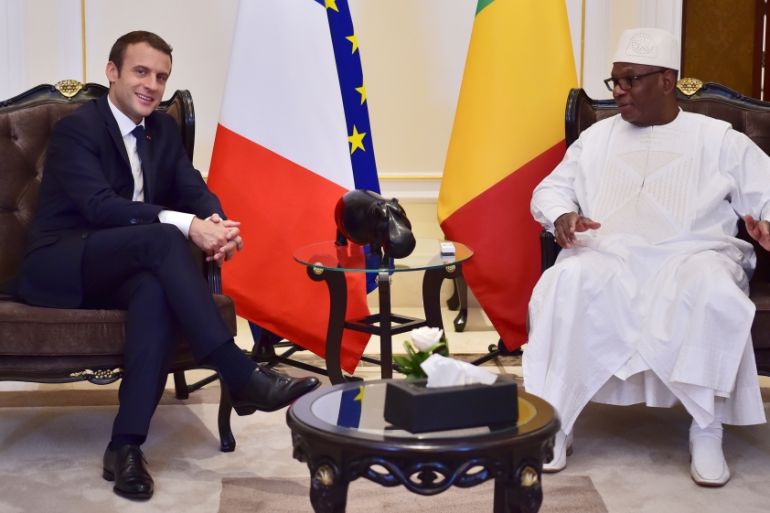Macron in Mali for talks with leaders of Africa’s Sahel
French president meets West African leaders to support new 5,000-strong force to fight armed groups in the region.

French President Emmanuel Macron has arrived in Mali for talks with the leaders of five countries across Africa’s Sahel region to support a new 5,000-strong multinational force to fight armed groups in the area.
Burkina Faso, Chad, Mali, Mauritania and Niger, which make up so-called G5 Sahel, have pledged to fight al-Qaeda-linked groups and others in the region who have alarmed the international community after launching deadly attacks in recent months on areas that were once considered relatively safe.
“Every day we must combat terrorists, thugs, murderers … who we must steadfastly and with determination eradicate together,” Macron said on Sunday at the opening of the summit.
In mid-June, the UN Security Council unanimously approved a resolution welcoming the deployment of the new force with troops contributed by the G5 Sahel countries.
READ MORE: Mali’s Keita vows to keep fighting ‘terrorist groups’
The approval came just days after at least five people were killed in an attack on a Mali resort popular with foreigners.
The Nusrat al-Islam wal Muslimeen group recently claimed responsibility.
France launched an intervention in Mali in 2013 to chase out fighters linked to al-Qaeda who had overtaken key northern cities.
That mission evolved into the current Barkhane deployment launched in 2014 with an expanded mandate for “counterterror” operations across the Sahel.
Key challenge is funding
Macron’s visit comes as al-Qaeda’s Mali branch released a proof-of-life video of six foreign hostages, including a French woman who was abducted in late 2016 in the northern Malian town of Gao.
A major goal at Sunday’s meeting will be to find the money necessary to support the new force, which will operate in the region along with a 12,000-strong UN peacekeeping mission in Mali, which has become the deadliest in the world, and France’s own 5,000-strong Barkhane military operation.
Al Jazeera’s Mohamed Vall, reporting from Mali’s capital, Bamako, said funding remains the crucial issue of the operations across the Sahel.
“There are troops here and they’ve been trying to solve the problem of insecurity in the region, but they haven’t been successful because the funding is at the heart of this situation,” he said.
“The UN is struggling now with the approach of the US that the UN should reduce its security budget around the world, and that US approach is touching this region.
“Funding is the main challenge that could cause this project to fail.”
![There are at least 12,000 UN peacekeeping troops and 5,000 French troops in Mali [Joe Penney/Reuters]](/wp-content/uploads/2017/07/adcd73abaed34e83a3d5ea76c7327d67_18.jpeg)
Macron is expected to announce on Sunday significant support, both financial and in terms of equipment, to the new force.
He is also expected to make the case for extra backing from Germany, the Netherlands, Belgium and the United States.
The European Union has already pledged €50m ($57.2m).
Serge Michailof, a researcher at the Paris-based IRIS institute, described the EU contribution as “a joke” in the context of the EU’s “very deep pockets”.
READ MORE: On the road with Niger’s peacekeepers in Mali
“This force is going to cost $300-400m at the very least,” he told the AFP news agency, adding it would be especially difficult for certain nations involved which are already “choking” on military spending.
Chad President Idriss Deby has said it will be difficult to contribute about 2,000 soldiers to the G5 force while also contributing to the UN peacekeeping mission.
“A summit like this is essentially a moment of political mobilisation around the new force,” Gilles Yabi, a West African analyst, told the Associated Press news agency.
“Efforts to mobilise resources will continue well after the summit, and the actual implementation will take several months.”